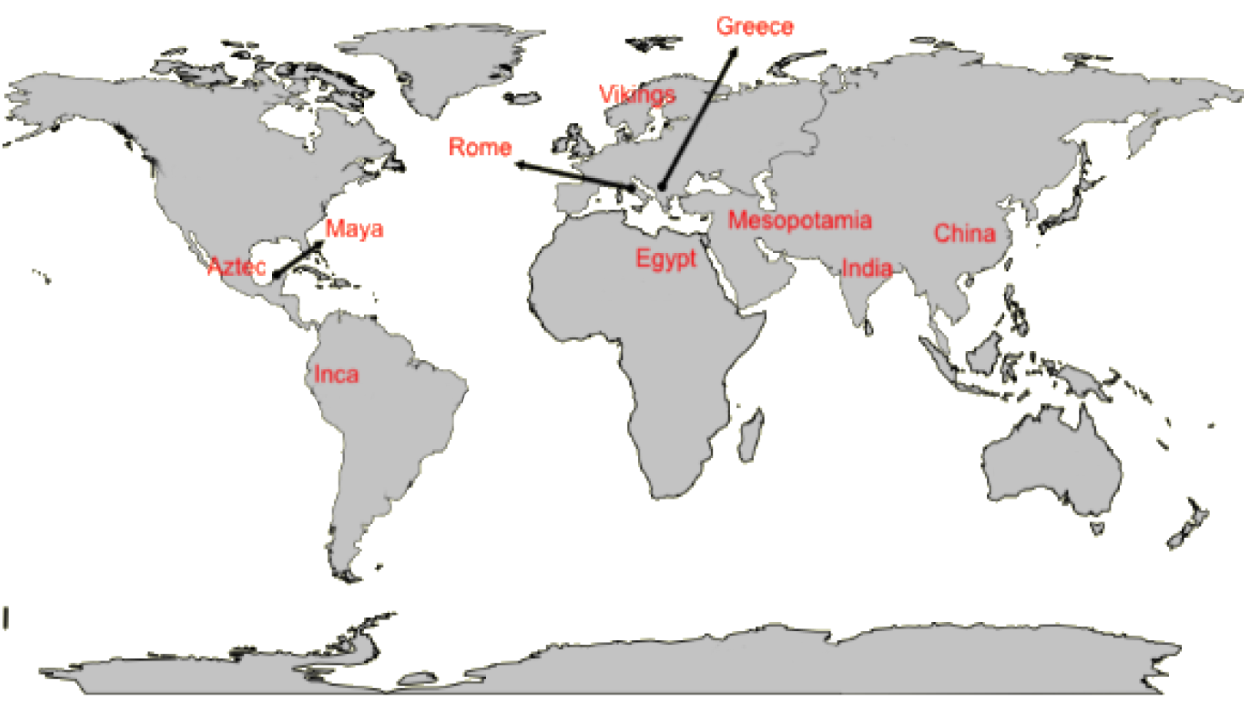Interweaving of 32 Mythological tales is the source of all stories
Mythological tales are quests to fulfil human desires
Contemporary stories borrow from mythological tales. Characters in Blue Beetle, Black Panther, Wall-E, and American Graffiti mirror the tale of Noah.
Noah's quest, driven by the fundamental human desire to survive The Great Flood, has transcended various civilizations & endured across generations. The continued relevance of Noah's story in present times attests to the enduring & universal appeal of this quest.
In essence, all stories are quests fulfilling human desires, often drawing upon mythological tales due to their representation of universal quests.
Universal Quest of Preservation
* Atrahasis, Deucalion, Fuhi, Manu,
Noah, Utnapishtim, Ymir, Ziusudra
32 Mythological tales represent every possible human quest
Every human desire has two possible outcomes: a fulfilled quest or an unfulfilled one. Jason and Gilgamesh both set out to find a valuable object, but their results were different. Jason successfully retrieved the Golden Fleece whereas Gilgamesh lost the Elixir of Life.
Driven by 16 basic desires, each prompting a quest, humans navigate through a spectrum of 32 unique quests—either realizing fulfillment or encountering unfulfillment. Across various cultures there exist mythological tales, each uniquely portraying one of these 32 human quests.
32 Mythological tales open the possibility for countless stories
While each mythological tale stands as a distinct quest, the true magic unfolds when these tales are combined, giving rise to unique and fresh stories. This synergy is evident in the epics of Odyssey and Ramayan, where various universal quests seamlessly intertwine. Likewise, the plot of Cinderella skillfully weaves together the quests of Independence, Social Contact, and Power.
Combining any five tales, generates a staggering 24 million unique story plots. Take it a step further by combining six tales, and the possibilities explode to an astounding 600 million!
Mythological tales that perfectly capture the 32 universal quests
At Mythosis, mythological tales from various civilizations were grouped according to the universal quests. The 32 tales selected are the ones that express each of the quests most comprehensively and have been passed down through generations.

32 mythological tales - Source of all stories
- Acceptance: Need for approval by others
- Accumulation: Need to collect & own
- Curiosity: Need to explore & discover
- Expedition: Need to find an elusive object
- Family: Need to nurture & protect
- Honour: Need to be loyal & obey moral codes
- Idealism: Need for fairness and justice
- Independence: Need for self-reliance & autonomy
- Order: Need for organization to maintain stability
- Power: Need to dominate others
- Preservation: Need to survive a threat
- Romance: Need for sex and courtship
- Social Contact: Need for companionship
- Status: Need for social standing & respect
- Tranquillity: Need to be in secure environment
- Vengeance: Need to get even or confront offenders
The 16 Basic Desires Theory, formulated by Steven Reiss, Professor Emeritus of Psychology and Psychiatry at the Ohio State University, presents a comprehensive framework for understanding human motivation. These 16 psychological needs, referred to as basic desires, play a pivotal role in shaping the human psyche and offer insights into a broad spectrum of human experiences, encompassing aspects such as relationships and values (Reiss, 2000a). This theory is grounded in extensive research, with peer-reviewed studies involving thousands of individuals from diverse backgrounds (Havercamp & Reiss, 2003; Reiss & Havercamp, 1998). This robust empirical foundation reinforces the credibility and applicability of the 16 Basic Desires Theory across various contexts.
Acceptance
Fulfilled: Theseus – Greek civilization
Unfulfilled: Karn – Hindu civilization
Accumulation
Fulfilled: Yudhisthir – Hindu civilization
Unfulfilled: Valmiki* – Hindu civilization
Curiosity
Fulfilled: Inanna – Sumerian civilization
Unfulfilled: Eve – Abrahamic civilization
Expedition
Fulfilled: Jason – Greek civilization
Unfulfilled: Gilgamesh – Sumerian civilization
Family
Fulfilled: Demeter – Greek civilization
Unfulfilled: Oedipus – Greek civilization
Honour
Fulfilled: Hanuman – Hindu civilization
Unfulfilled: Hippolytus* – Greek civilization
Order
Fulfilled: Ram – Hindu civilization
Unfulfilled: Bhishm – Hindu civilization
Independence
Fulfilled: David – Abrahamic civilization
Unfulfilled: Daedalus – Greek civilization
Idealism
Fulfilled: Krishn – Hindu civilization
Unfulfilled: Prometheus – Greek civilization
Power
Fulfilled: Circe – Greek civilization
Unfulfilled: Ravan – Hindu civilization
Preservation
Fulfilled: Noah – Abrahamic civilization
Unfulfilled: Kans – Hindu civilization
Romance
Fulfilled: Savitri – Hindu civilization
Unfulfilled: Leander – Greek civilization
Social Contact
Fulfilled: Psyche – Greek civilization
Unfulfilled: Amba – Hindu civilization
Status
Fulfilled: Joseph – Abrahamic civilization
Unfulfilled: Kaikeyi– Hindu civilization
Tranquillity
Fulfilled: Odysseus – Greek civilization
Unfulfilled: Sita – Hindu civilization
Vengeance
Fulfilled: Dron – Hindu civilization
Unfulfilled: Duryodhan – Hindu civilization
We assessed thousands of mythological tales against the criteria of Aristotle's ideal plot definition. Each tale had to meet the requirements of Unity, Completeness, Magnitude, Universality and a definite Structure. Only 32 of them fulfilled all five conditions. These 32 tales are the superset of all tales across cultures.
Some quests don’t have any mythological tale that completely satisfies the “Magnitude” criteria. These tales have been substituted with Fables/Legends/Classics which satisfy the 5 conditions. For instance, Hippolytus has been replaced with the quest of Siavash from Persian literature. Valmiki with the story of Scrooge.
Some quests don’t have any mythological tale that completely satisfies the “Magnitude” criteria. These tales have been substituted with Fables/Legends/Classics which satisfy the 5 conditions. For instance, Hippolytus has been replaced with the quest of Siavash from Persian literature. Valmiki with the story of Scrooge.
